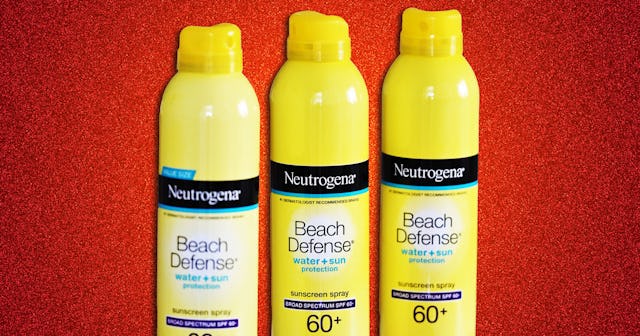There's Been A Voluntary Sunscreen Recall — What's In Your Medicine Cabinet?

This summer is hot. The part of the country I’m in is experiencing more 95 plus degree days with raging humidity than I can remember in previous years. Chances are the part of the country you’re in is also experiencing sweltering heat. (Anyone else stay awake worrying about climate change?)
In the face of all that heat and sun, most of us are reaching for sunscreen, slathering it on ourselves and our kids, to protect from sunburns and skin cancer. By and large, we believe sunscreens are safe, that we’re doing something good for our kids by pausing their summer fun for a few minutes to apply sunscreen.
Neutrogena And Aveeno Products Voluntarily Recalled
A recall by two brands recently put that assumption to the test. An independent testing company found levels of a dangerous cancer-causing chemical in a number of spray sunscreens. Out of “an abundance of caution,” Neutrogena pulled them off the shelf. Aveeno did the same. The recalled products include:
- Neutrogena® Beach Defense® aerosol
- Neutrogena® Cool Dry Sport aerosol
- Aveeno® Protect + Refresh aerosol
- Neutrogena® Invisible Daily™ defense aerosol
- Neutrogena® Ultra Sheer® aerosol
Customers seeking a refund can use this form.
The independent testing company also found concerning levels of benzene in other sunscreen samples. However, they have not been recalled as of this writing. According to CNN, those include:
- Eco Formula Sunscreen Lotion SPF 30
- Advanced After-Sun Gel by Sun Burst
- Sunscreen Lotion SPF 30 by SunBurnt
- Sunscreen Lotion SPF 30 by Goodsense
- Ultimate Sheer Sunscreen Lotion SPF 70 by TopCare Everyday
- UV Aero Broad-Spectrum Full-Body Sunscreen Spray, SPF 45 by EltaMD.
Kids Max Protect & Play Sunscreen C-Spray SPF 100
- UltraMist Deep Tanning Dry Oil Continuous Clear Spray SPF 4
- Ultra Sport Clear Sunscreen Spray SPF 100.
Benzene Was Detected
Aimee Dilger/SOPA Images/LightRocket/Getty
The independent testing company found high levels of benzene in the sunscreens. Benzene is an industrial solvent. It’s used to make a variety of things like plastics and can be found in gasoline, crude oil, and cigarette smoke. It is not typically used to make sunscreen.
In fact, it shouldn’t be in sunscreen at all. In a press release by the testing company, Dr. Christopher Bunick, MD, PhD, Associate Professor of Dermatology at Yale University, confirmed, “There is not a safe level of benzene that can exist in sunscreen products.” He said, “Even benzene at 0.1 ppm [parts per million] in a sunscreen could expose people to excessively high nanogram amounts of benzene.”
Several of the recalled sunscreens were way beyond that 0.1 ppm. The independent testing company found “significantly detectable benzene”, according to the citizen petition the company filed with the US Food and Drug Administration. The petition stated, “Some batches contained up to 3.1 times the conditionally restricted limit.”
According to the tests, Beach Defense, Invisible Daily, and Ultra Sheer contained levels of benzene that were 2 ppm or higher.
That’s all already concerning. Even more concerning—it’s unclear how the cancer-causing contaminant got into the sunscreens.
Leukemia Is A Potential Side Effect
Benzene is a known carcinogen. According to the National Cancer Institute, “Exposure to benzene increases the risk of developing leukemia and other blood disorders.” The CDC also warns that exposure can cause loss of white blood cells or anemia.
If you’ve used any of the recalled sunscreens or put it on your kids, don’t panic. In an interview with NPR, Dr. Daniel Teitelbaum of the Colorado School of Public Health confirmed that, by itself, using that sunscreen probably isn’t a huge risk.
The problem becomes that we also have a lot of background exposure to benzene in the air we breathe. “[T]hat, of course, adds up,” Teitelbaum said.
So—don’t panic, but do pay attention.
Sunscreen Recalls Are Unfortunately Not Novel
Unfortunately, this isn’t the first time sunscreens have been in the public eye for the wrong reasons, whether because they contain chemicals that can disrupt hormones or they’ve been shown to be ineffective. In the past, well-known brands including The Honest Company and Babyganics were called out by worried consumers.
The 15th Annual Guide to Sunscreens, published by the Environmental Working Group, found that 75 percent of the products they analyzed did not provide adequate sun protection or included harmful ingredients.
None of that is what we want to hear when we’re reaching for the sunscreen as we herd the kids out of the house. But also, none of that is a reason to put the sunscreen down.
“The answer is not to throw up our hands and say no sunscreen is safe,” Nneka Leiba, EWG’s vice president of healthy living science said in an interview with CNN. “There are at least 200 recreational sunscreens in our database that got a thumbs up.”
Dr. Adam Friedman, chair of dermatology at George Washington School of Medicine, urges folks to “[g]o back to basics – you know, the creams and lotions and liquids. Those have been around forever.”
He suggests mineral-based sunscreens, like zinc oxide and titanium oxide, which are not absorbed into the skin.
Families can also protect themselves from the sun’s rays by wearing hats, shirts, and shorts designed to protect the skin and avoiding the sun (or seeking shade whenever possible) between 10 a.m. and 4 p.m. when the sun is strongest.
And mostly, keep in mind that this recall is definitely not a reason to stop using sunscreen. It is, however, a reminder to stay informed.